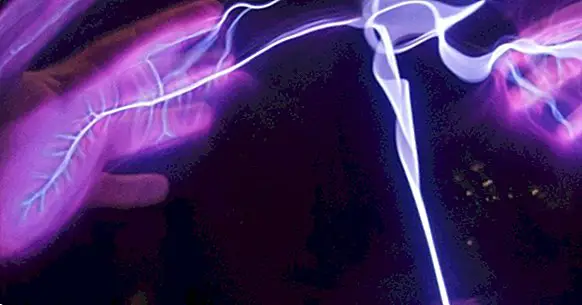Electrophobia (fear of electricity): symptoms, causes and treatment
Fear is one of the oldest sensations and emotions in the animal kingdom and one of the, although unpleasant, most useful for survival. Thanks to him we can prepare to fight or flee to avoid dangerous stimuli.
However, sometimes an irrational or disproportionate fear may appear towards stimuli that are either not dangerous or that although they may pose a danger, the risk of facing them is not as high as what is feared. One of the latter is the panic that appears in electrophobia , about which we are going to talk next.
- Related article: "Types of phobias: exploring the disorders of fear"
Electrophobia: basic definition
It receives the name of electrophobia to a specific type of phobia, in which it appears Extreme fear or dread towards electricity .
As a specific phobia that is the existence of an irrational and / or disproportionate fear towards a stimulus or type of specific stimulation, in this case the aforementioned electricity. Exposure to the stimulus or the simple idea of coming into contact with it generates great anxiety in the person, to the point of generating physiological symptoms such as hyperventilation, tachycardia, dizziness, nausea and vomiting and may even experience anxiety crises.
The fear that people with electrophobia have is usually towards electricity or electrocution, although usually extended by association to most electrical appliances plugged in . Occasionally it is also possible that fear or phobia of electrical storms appear, as an intimately related phobia.
symptom
The great fear and anxiety generated by the stimulus generates an active avoidance or flight of this and everything that may be related to it. In the specific case of electrophobia, the subject will tend to avoid approaching or using most electrical appliances, approach high voltage towers or lightning rods or manipulate cables or electrical installation of the home (for example, thermal). It will also tend to avoid plugs.
This avoidance will generate a great affectation in the subject, given the high prevalence of the use of electricity in our day to day. Many jobs or leisure systems can be highly anxious for these people , besides causing difficulties to use or fix if necessary tools, instruments or appliances. In some cases there may even be anguish at the idea of using electrical elements necessary for the health of the subject, such as those devices that use electrodes, respirators or certain implants.
- Maybe you're interested: "Types of Anxiety Disorders and their characteristics"
Causes of this phobia
Electrophobia is a specific phobia that is highly disabling in a society like the present one. Its causes are not entirely clear, although there are different hypotheses about it.
The truth is that contrary to what happens with other phobias, this fear is to some extent logical since it really is a danger: we can really electrocute ourselves if we manipulate electrical devices. However, this does not imply that fear and avoidance of electronic instruments are not disproportionate in relation to the real risk of electrocution.
The emergence of this phobia may be due to the experience of aversive experiences linked to electricity: many of us have sometimes received a spark manipulating electrical equipment, and in some people may appear fear of what might have happened to be greater the current electric
As well it is possible that electricity is associated to the experience of traumatic events : to have seen someone die electrocuted (by accident or suicide), to have lost a loved one for this reason, to have had an accident that generated feeling of helplessness or to take the subject or acquaintances to the hospital or even to have been tortured. In these cases, pain and helplessness can be associated with electricity and fear and anxiety appear in the presence of electricity.
Treatment
Electrophobia can have serious repercussions in the daily life of the patient, so that looking for an effective treatment to solve it is something necessary.
One of the most successful therapies in the treatment of this and other phobias is exposure therapy . To do this, a hierarchy of exposure has to be carried out, that is, to prepare an ordered list of anxiety-generating situations. It is important to keep in mind that the objective is not to feel anxiety but to acquire the ability to manage it (something that in the long run will probably cause the disappearance of fear and anxiety).
In the case at hand we obviously will not electrocute the patient, but we can develop a hierarchy that integrates, for example, observing and being at different distances from an electrical outlet or cables, plugging or unplugging appliances, or using a device that requires electricity. .
Light electrical stimulation could also be used in the form of light, controlled discharges that can not cause harm, in a controlled environment. Keep in mind that some items that the patient can imagine should be avoided as they can be dangerous, in which case they should be reconsidered.
Once the hierarchy is done, the exhibition will be made gradually , starting by generating items of an intensity that does not generate excessive fear but that is challenging. The exposure to a specific item will be carried out until the level of anxiety before exposure is greatly reduced and imperceptible in two consecutive trials.
Along with the previous therapy, cognitive restructuring is usually useful, in order to work on the patient's beliefs. The aim is to observe the patient's beliefs regarding electricity and the risk involved, and to work towards an interpretation of anxiety situations that is less threatening and more realistic with respect to the possible risk.
In any case, it will always be necessary to assess what the fear means to the patient, when it originated and what is considered to have caused it. Also its negative and positive consequences. All this will allow to work both with the previous techniques and with other alternatives.



















